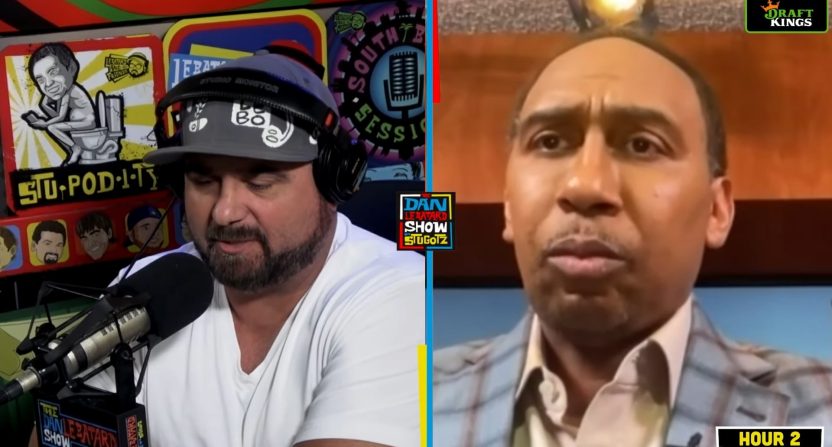When ESPN president Jimmy Pitaro implemented a stick to sports mandate a few years ago, Dan Le Batard struggled to cope with limiting discussions of the social and political issues that are important to him. Stephen A. Smith, however, thrived at ESPN in recent years, despite being told not to talk about politics.
Smith joined The Dan Le Batard Show Wednesday, where the two discussed the morality of the “stick to sports” position ESPN took in 2018 and they debated how to deal with it on an individual basis.
“You’re someone who very much believes in the idea of, ‘you have to take care of the company, the product and the customer,’” Le Batard said. “You and I would have disagreements at ESPN over things like that because I had less respect for the idea of company than you did.”
“I’m looking at the big picture,” Smith recalled telling Le Batard when he still worked for ESPN. “Let’s not blow it because we want to express ourselves.”
After battling the company over freedom of expression, Le Batard eventually parted ways with ESPN, not solely because of the mandate, but he certainly appreciates the freedom of no longer having to answer to their bosses. Le Batard’s final show at ESPN even ended by playing George Michael’s “Freedom,” a not so subtle message for his former bosses. But Smith countered that part of why he’s been able to thrive at ESPN since they decided to limit political talk from the brand, is that he understands the position.
“ESPN took the position a few years ago, ‘we’re not gonna talk about politics,’” Smith said. “You had some people that had a problem with that. Here is my issue, I understand.”
“The rules have to be for everybody if it is truly a rule,” Smith continued. “But my biggest issue is this: When you’re tuning into a sports network, it is not beyond the pale for the consumer to say, ‘I expect to hear about sports,’ okay? There’s nothing wrong with that.”
Smith noted he has an issue with the company dictating what people say outside the walls of ESPN, but acknowledged it can get tricky. If Smith says something controversial in an interview with CNN, or he tweets a polarizing political message on his personal Twitter account, it’s still going to be reported on as “ESPN’s Stephen A. Smith said…” even though it was conveyed outside the confines of The Worldwide Leader.
Le Batard argued the line is too blurry even inside the walls of ESPN, explaining that sports have been infiltrated by political issues with leagues being connected to dirty money from Saudi Arabia and China.
“Where’s the line on some of this stuff?” Le Batard asked. “There are all sorts of things embedded here that make it impossible for us to always be linear in our principles.”
“The lines are unquestionably blurry,” Smith admitted. “But I think it’s important to understand Dan, it might be blurry for me and you but as a business, it may not be blurry for them. In other words, the line for them is ‘What’s gonna compromise our bottom line? If something is gonna compromise our bottom line, we have a right to take the position we take as a company.’ As an individual, we might disagree with that, but we also chose to work for them.”
ESPN has not fully eliminated social and political discussions from the company, instead taking it on a case-by-case basis. Presumably, deciding when to be lenient based on whether the issue will compromise their bottom line, as Smith explained.
They decided Jemele Hill’s criticisms of Donald Trump were going to compromise the bottom line and ultimately parted ways with her in 2018. ESPN, however, allowed Smith and its employees the freedom to discuss social matters after the murder of George Floyd caused unrest throughout the country in 2020. But taking it on a case by case basis makes it difficult for employees to know when it’s OK to discuss a topic, and when it’s not.
“There are rules and regulations that may be blurry at times,” Smith said. “But sometimes, that’s when you gotta take the position, ‘is this worth alienating the organization that I work for?’ Most things are not. Some things may be.”







